#reflective-essay
Text
where is 'home' ?


"What is taking you so long to choose what to bring? Do not bring clutter, those are not important anyways. Just the ones you need that can fit in the balikbayan box is enough," my mother berated me as I stared at the big pile accumulating in front of me. She has been asking me repeatedly for twenty minutes yet I only sorted at least half of what I really want to bring to our supposed 'new home'.
Not much of an impressive progress to her (I am not a fast packer, you see) but the on-going turmoil within me seemed more important than minding what could be the biggest turning point of my life.
I am not new to packing for trips, for long-week vacations, or for temporary visits to provinces where relatives I rarely meet except during holidays reside. I am not new to packing the usual toiletries, eco-friendly notebooks I asked for every Christmas Party that is barren of words and cartoon-themed towels that barely dry the surface of your skin but keep anyway because towels are great. Yet, for some reason at that moment, I can barely choose between a cream-colored top and simple graphic tee as casual clothes. Moving houses are indeed a huge step towards change.
It was the month of December in the year 2021. The air was cold, as usual. Everyone can finally feel the spirit of Christmas after living for two years of social isolation and families can finally gather together without the fear of disease. It was such a joyous moment, a sign of progress that things are going to go back to how it used to be. I was happy. I liked to believe I was, yet looking back on it, I cannot say I was happy of change, of the uncertain, of the future. In fact, I was terrified.
Terrified was not the only emotion I felt. There was also guilt and regret. Guilt that I took advantage of the years of not really living in the moment with the people I hold dear to me and regret that there was only limited time to say goodbye. It turns out it was not just me who was not ready for change. Before I knew it, I was boarding a plane on the way to my new home, staring at my empty Messenger inbox at three in the morning after sending my last goodbyes out of boredom while waiting.
The morning we landed, I realized something on the way to the apartment we were supposed to be staying in while looking out the cab window: Everything is so green. So lush of vegetation which was very different from where I grew up. There were fields beyond fields of green, tall trees that loomed over and provided just enough shade from the blistering sun. Of course, there were also stories of buildings and hotels that you can only see flourishing in the city. Strangely enough, there was relief and a new sense of excitement that ignited within me. Everything immediately felt familiar. At first, I did not understand why I even felt uneasy because I can see myself doing fine in living here. It was new but it provided me an opportunity to start a new life. I was wrong.
Turns out, I was getting ahead of myself. Countless amount of sleepless nights from worries of fitting in with my peers, of keeping up in society, of understanding the language I only heard from my parents but never had the chance to learn from first-hand. It was such a difficult time of adjustment that lasted for several months of staying in our new place. Giving up was always the option until I finally found my footing. I can say that for me, the start of a face-to-face pilot opening definitely helped me come out of my shell. Not because I wanted to but more on being forced out of it for the sake of academics and socialization. It was not the most ideal motivation but it helped in a way that I could find my people.
You might be wondering by now, where is this home that I am talking about? To answer your question frankly, I am still yet to find out where my home is. I can say my home is back in my old house, or in our current apartment, or in the city I used to live in for the past 16 years. But, saying that would mean I am not being entirely truthful because our "home" is more than its physical structure. It is in the people you surround yourself with, in the familiar route you take back home, in the food you eat from your favorite restaurant that you go to when you feel you deserve it. Home will always be where you feel most comfortable, where you can freely be vulnerable without fear or judgement.
Photo credits to: https://www.detourista.com/place/iloilo/, https://ko-fi.com/s/87d3c15536
1 note
·
View note
Text
I'm sorry but the irony of Nico calling Max unprofessional is sending me so bad like sir there's an entire garage full of people, who were literally in the trenches trying to survive the Brocedes fallout while just doing their jobs, who might have a few things to say about your (& Lewis') level of professionalism at that time 😭✋️
#f1#formula 1#formula one#max verstappen#nico rosberg#lewis hamilton#brocedes#like niki lauda had to try multiple times to literally parent trap them to try and get them on speaking terms it never worked#because one would arrive they'd see the other and the other would leave#& if i remember correctly the garage crew would swap around from race to race as a like see we aren't favouring anybody gesture 😭#and thats no shade to nico because it was both of them contributing to that environment#his comment re max is just making me laugh#like if i was a part of the pr/media team - which is a part of the degree I'm working on irl - at merc that year i would've lost the plot#like its insane reflecting on it nearly a decade later but the poor souls just trying to do their job in the eye of that storm#truly gods strongest soldiers#ngl the professional comment irks me a bit because its not like max is engaging in inappropriate work place behaviour#he's engaging in another aspect of racing that his involvement raises awareness of & that makes racing more accessible#& we all know how inaccessible not only getting into racing is but also to continue to pursue the further along you go#theres so many stories of 1 sibling giving up racing so the other can keep going because the family can't afford for them both to race#its a huge financial strain & we only see a handful of drivers talk about that & try to do something to change it#and nicos fellow sky sports commentators are routinely unprofessional on so many levels#additionally max had a lot of valid reasons to be annoyed at his team today#but alas he's not english so he's ungrateful#i hate that drivers can't criticise their teams or car without immediately being branded as bratty & ungrateful#ESPECIALLY WHEN THEIR JOB IS TO GIVE FEEDBACK#you can see the double standards from sky when say Lando or George have complaints with their team/car v the likes of Max and Yuki#especially Yuki my god the things i would do to get the British media to leave him alone#this was a jokey post at one point and then became a rant whoops lmao#I'll leave it that before i write an actual essay here 😭✋️
511 notes
·
View notes
Text
ill be honest as much as i love to criticise the use of fatphobia for comedy ill never be able to hold the fatphobic jokes in kung fu panda against it
like yea those movies are guilty of dipping into The Usual Tropes for a cheap laugh but not only is the character writing for the fat characters the strongest and most sympathetic ive Ever seen literally just the character designs of the pandas in the 3rd movie get me choked up sometimes. theyre all so appealing and clearly treated with the same care and attention as everyone else without copping out and making them Barely Fat. po is already a size that doesnt exist in film protags and hes still the thinnest person in that whole village and that meant a lot to me
#i havent seen the movies in ages but the design of the ribbon dancer is sooo . AUGH#like not just to have that many fat characters but have them be REALLY fat without being treated as ugly or nasty#OR THEIR FATNESS BEING TEMPORARY !!! its their natural state thats how theyre meant to look!!!!#its easy to get caught in the thinking of like. having fat characters be a minority in a lineup to reflect 'real life'#EVEN THO that isnt always true but regardless#having a cast where the nonfat characters are so few and far between theyre hardly present at all. so fucking enriching 2 me#imo writing-wise the third one is by far the weakest but it still is just so important to me that they designed the pandas like that#can i kfp post on main is that allowed#idk i watched a video essay im emotional abt this again
1K notes
·
View notes
Text
thinking about John Doe and the dark world as a metaphor for addiction/relapse.
How circumstance and trauma pushed him to do something he told himself he’d never do again, and how he has to live with the consequences and the memories, even though he’s working to not be that person anymore.
And how much shame he carries about the things he’s done, because even if he was pushed to do them, he still did them. To him, he still made that choice, and he has to bear the weight of that.
Thinking about 43, in particular, where the witch is trying to tell John that all he was is all he’ll ever be. That, despite the work he’s put into bettering himself, he’ll only be seen as his mistake in the eyes of some.
And it just feels really meaningful that Arthur’s love is what saved him, in this context. That being forgiven and loved unconditionally, even though he’s made mistakes and hurt people, is how he can cope with the memories of what he’s done. It’s how he can stop himself from slipping back into being someone he doesn’t want to be, even when it’s hard.
love isn’t what makes him better, but it’s what makes him want to work to be better. It doesn’t undo what he’s done but it allows him to live with it.
I just think it’s interesting to read this as an addiction narrative, because so often addicts are dismissed because they’re addicts. Regardless of how much we’ve healed or how far we’ve come, there are some people who will never see beyond our addiction and will force their perspective onto us. Some people hold no compassion for us because they think we’ve made the choice, and think that the harm that resulted from that “choice” makes us unredeemable.
and to see John receiving Arthur’s support and love despite what he’s done, or what he was pushed to do, really reflects how important support is to recovery. Arthur doesn’t absolve John of his mistakes, he doesn’t dismiss the harm he caused, but he doesn’t hold it against him. He knows John is more than what he’s been, he knows John is capable of change and a good person in spite of it, he knows John is capable of being better. Only John can do the work of becoming who he wants to be, but Arthur’s love and support makes the work a little more bearable.
#This is a little bit incoherent and rambling#I just have a lot of feelings about John Doe and I have been thinking a lot about my own recovery and how much John in 43 reflects relapse#In part because I’ve been really afraid of relapsing recently#Tagging this but I’ll probably delete it later#malevolent#john doe malevolent#Also I could probably write a huge essay about this I have so much to say about it and I am willing to cite my sources
235 notes
·
View notes
Text
I'm So Evil, And Skanky, And I Think I'm Kinda Gay (Bad Girls)
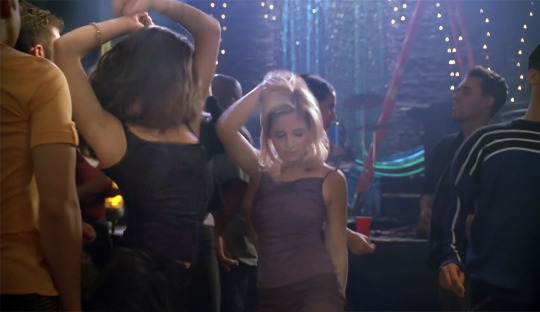
In 1872, a full twenty-five years before the release of Bram Stoker’s Dracula, Irish author Sheridan Le Fanu published Carmilla. This story depicts the relationship between the young and innocent protagonist, Laura, and the confident and mysterious title character, Carmilla. A friendship blossoms between Carmilla and Laura and the two become close, but over time Laura becomes suspicious of Carmilla’s strange behaviour. She flees from her, and it is revealed that Carmilla is a vampire who has been preying on Laura – feeding on her nightly and attempting to turn her into a creature of darkness. Carmilla is confronted, killed, has her head removed and body burned, and the ashes of both are thrown into the river.
A simple story and much shorter than a true novel, Carmilla’s historical impact outweighs its length. Not only is it one of the earliest and most notable pieces of vampire fiction, and a great influence on Dracula itself, it is also the origin point of one of the most controversial tropes in this genre of fiction: the Lesbian Vampire.
The vampire myth as constructed by Dracula and its compatriots positions vampires as a corrupting sexual influence upon women. Older men sneak into the bedrooms of virginal young women, penetrate them, and therefore transform them into something tragic and ungodly. They personify a threat to patriarchy; a threat perceived in the form of female sexuality. The idea is that an unmarried woman having symbolic sex will irrevocably twist them into some kind of monster.
The Lesbian Vampire exists as an extension of this idea, focusing on one of the most diabolical threats to patriarchal ideology – a woman who sexually desires another woman. Carmilla’s victims are exclusively female, and her pursuit of Laura is very visibly romantic in nature. She kisses Laura, confesses love for her, the two take walks in the moonlight and embrace each other. This is what leads to Carmilla feeding upon Laura and threatening her death. Symbolically, there is no separation between the two. The danger Laura is in is caused by same-sex desire. Carmilla’s villainy is her lesbianism. The trope does not have to include vampires in a strict sense, but more generally the link of sapphic seduction leading to corruption.
Read More
#btvs#buffy the vampire slayer#btvs meta#meta#essay#insect reflection#faith lehane#s3#bad girls#theme: queerness
218 notes
·
View notes
Text
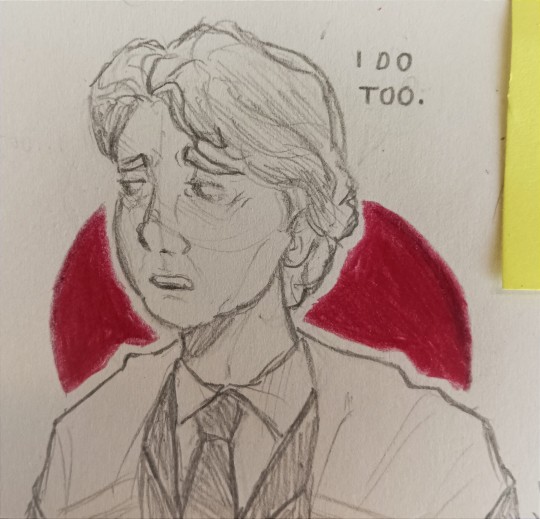

The "I do too" from Marvin after "Do you take this man to be your husband?" in In Trousers absolutely destroyed me so here's this!!!
#Christian Borle as Marvin because he's the only Marvin I've drawn before#also I just really like his face#the clothes are nothing like what he wears in the college production In Trousers#(which I based this on)#but that's cause i wanted to try giving him traditional Jewish wedding clothes and stuff#they just gave him a normal ass suit in the college production/j#AND THEY DIDN'T INCLUDE THE BREAKING GLASS BIT FROM THE 1985 SCRIPT??#which I understand why they wouldn't yk#but still. something about Marvin trying to break it and missing#before Trina does it instead#insert essay about how that reflects their marriage/relationship#I'm insane about this guy#marvin falsettos#in trousers marvin#the marvin trilogy#in trousers#falsettos#christian borle#MILO ART#he looks kinda goofy help :(
197 notes
·
View notes
Text
Let's talk about Gale's sex scenes
I love the astral sex scene and it means so much to me, and I have some problems with the way I've seen it talked about.
I should start by saying this post is not intended to critique anybody's personal preferences. The license to do Whatever The Fuck in an rpg is sacrosanct and there are no wrong choices. But I’ve also seen people imply that the astral scene is not “real” sex, or that Gale romancers “deserved more.” I hope I do not have to explain why that's kinda fucked.
Additionally, I think it is a saddening misread to call the astral scene “performative” in contrast to the bed scene (which gets correspondingly framed as “showing Gale that you want the real him.”) But doing a grandiose magical gesture IS the real him!
I know I'm not alone in viewing Gale as autistic; for me the astral sex scene is a big contributor to that. For one thing, it resonates with the concept of having unusual sensory wants. For another, it reads to me as Gale opening up and showing his passion for magic to the PC in a way he’s never been able to with another mortal before. What neurodivergent person has not had someone view their passion as too weird or too over the top? Have you ever been at a level of enthusiasm that wraps back around into seeming “performative” to others? Ever wanted to show a loved one something that matters to you, but worried they’d never understand—or, worse, they’d actively cringe?
In the astral sex scene, Gale shows the PC how much he loves the Weave (which is not the same as loving Mystra), and the PC does not cringe.
If all the glowing merging translucent bodies, the nebulae, the multiplying limbs, the spinning, the trippiness, the celestial music—if all these trappings made you, the player, cringe: there is nothing wrong with that. But I do think it is a misread to say that the bed version constitutes “helping him heal from his trauma.”
Maybe I have a hair-trigger for anything that implies “becoming more sexually normative = character growth.” Or “vanilla sex = a more intimate connection.” But they are just such tiresome concepts.
I understand that some of the dialogue in the game also suggests that idea, but all that dialogue is coming from the PC. What Gale says is that having bodily sex is “a small gesture toward your comfort.” This has been widely glossed over, imo.
Ultimately the two versions of this scene fulfill two different narrative functions: the bed version is to show the player that Gale will set these wants aside for you should you ask him to. But the astral version is there to show the player who HE is and what HE wants. And I think it is sad to write off this beautiful, lovingly crafted, unique and creative approach to a sex scene as merely something “performative” that he only does because Mystra made him think he had to.
“Stay with me now. There are endless worlds out there. Countless ways to declare love. Infinite ways to express it. Too much for one night... but we shall try.” I've admittedly got a ways to go in the game, but so far this is my single favorite line of dialogue. I genuinely don't understand how people can hear this line, the way it’s acted, and think it's just for show. He knows he's about to get weird but he longingly, vulnerably asks you to stay there in his weirdness with him.
Many writers, when they are writing something kinda out there, have doubts of the form Who is this even for? If the astral scene just isn’t for you I don't have beef with that. But the people who saw the astral sex scene and went "Oh, my god, now THIS is FOR ME"—are perhaps people who only very rarely get to watch a sex scene and have that reaction.
I'm glad Baldur's Gate brought something this beautiful to this particular table and I think it deserves consideration as a serious element of Gale’s characterization.
#gale dekarios#gale of waterdeep#baldur's gate 3#bg3#bg3 meta#the promised essay#i made a very rabid shitposty untagged version of this earlier#and i think it upset a few people#this version is a better representation of my reflections#verbose bitch romances the party wizard news at 11#wizardsexual#long post
745 notes
·
View notes
Text
spoilers up to the end of dressrosa arc here but. I can't stop thinking about how Law takes on Rosinante's will. Corasan freed him from Doflamingo and the marines and the world government and everyone that ever could have touched him at the time, but has Law really felt free? “Everything I do until I die represents what Corasan achieved” is sweet until you recognise that Law is willing (and planned) to go to the grave for that belief. Until Doflamingo dies there is always a part of him stuck in that treasure chest, constrained by what Law felt happened to Corasan due to him that day.
It's crazy how textbook survivors guilt victim Law is (I’m new here so I wouldn’t be surprised if this isn’t the first time this has been brought up), but let’s just quickly go over some symptoms:
Obsessive thoughts about the traumatic event ✅
(will go over this in greater detail below)
A sense of disconnection or detachment/need to isolate oneself from others ✅
(Law doesn't fully isolate himself but he definitely has his walls up at all times, though there are often subtle hints of him enjoying the company of the people he chooses to surround himself with. He is notably more reserved, emotionally unavailable, cold and distant than others around him, and watching closely you'll notice that even physically he has a tendency to situate himself three steps behind the group)
Insomnia, nightmares, flashbacks of the traumatic event ✅
(if we can assume some of his backstory expressed in Dressrosa are flashbacks, and also assuming that the perpetual eyeliner he wears are covering some pretty heavy eyebags. Also mention that the only time we see him resting is against Sunny's mast on the way to Dressrosa - and that was 1. a filler episode, and 2. if he was sleeping, it was very quickly interrupted by an attack by petplay guy - a nightmare in of itself)
Irritability and anger ✅
(though elements of this could just be attributed to Law's personality or a natural response to the straw hat's shenanigans, as well as Luffy's total inability to stick to a reasonable plan)
Feelings of despair and thoughts of suicide ✅
(that's Law's Dressrosa arc babe)
Now, there's many reasons why Law is unable to move past this guilt (an apparent lack of therapists in one piece being one of them) - but his inability to believe in unconditional love is likely the biggest offender.
Law may have started off (initially) with one of the most fortunate, stable beginnings, with a loving family and a big house in a rich country (wealth of which was built off the back of lies and corruption and the murder of innocent future generations - we'll get there). But he had a mother and a father who loved and nurtured Law (and were both highly respected doctors in their own right who citizens trusted and relied on). Law's happy beginnings really juxtapose the unfathomable horror that had been lying in wait in Flevance.
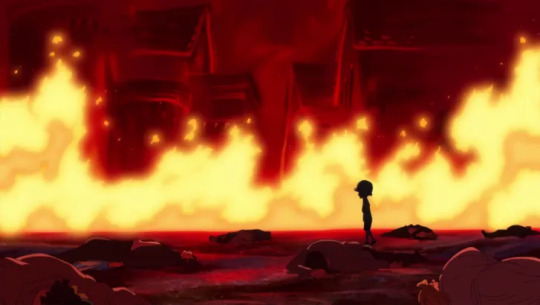
Even when shit started to hit the fan, at a very young age (<10 yrs old), Law was already stepping up and showing love for his little sister (lying to her when she was on her deathbed, knowing full well he would likely face the same fate after reading his charts, putting on a brave face for her so she wouldn't be afraid when the screams began to reach their front door, hiding her away when soldiers sieged their home and rushing to check on his parents). Given everything that happened in Flevance, it's completely understandable that, while Law will likely never forget the love his family gave him, remembering it became twisted in the lasting memories of his home — parents riddled with bullet holes. a closet holding a sick little sister waiting for him in a house engulfed by flames. stumbling through a town of friends, neighbours, just... people he used to pass by on the street, now all dead.
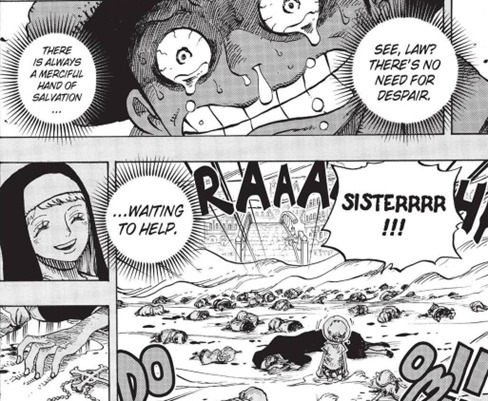
Seeing hell, knowing why and how it transpired, who were responsible (spoilers, the World Government; the same body that most citizens believe exist to protect them — yeah, sister "a merciful hand of salvation waiting to help" were perhaps the worst possible combination of words you could have left Law with here. Likely instrumental in having him lose his faith "I don't believe in anything anymore."), knowing he is the only survivor, and fated to die anyway due to the terminal illness that is slowly killing him because some figureheads years back were greedy and the governing powers above the figureheads were willing to cover up everything if it meant garnering a portion of wealth and maintaining influence and control. It's beyond grief, beyond rage. And there's absolutely nowhere Law can put it. No one he can retaliate against. Who could come out of hell knowing this and not want to see the world burn?
So, smart little Law escapes under a pile of bodies and goes to the one person infamously revered for being in the business of that kind of thing. And boy oh boy I can only begin to imagine how a young and impressionable Law - fresh from a genocide, with a hole in his heart and a hatred for everything still alive - had his concept of love warped whilst surviving those two years around Doflamingo and his family. A family where members are only welcome so far as they are useful to Doflamingo and his aspirations. Of course Law's going to pick up some fucked up ideas about how love works outside this little white fence he grew up and watched burn down.
Then. Enter Corazon.
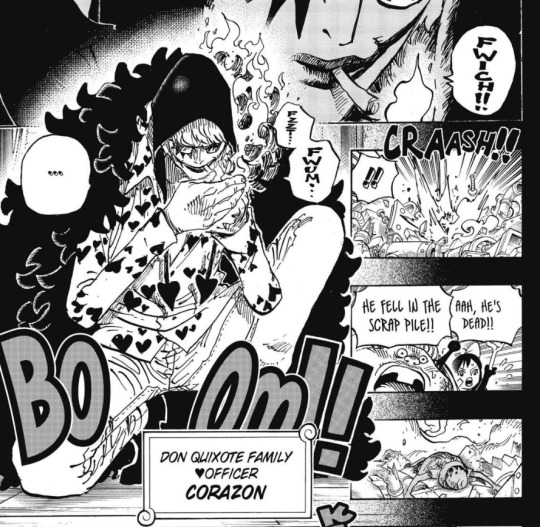
Their relationship may begin on shaky legs (near-juvenicide via defenestration in a failed attempt to ward Law away from sticking around) but Corazon quickly becomes the one person in the world Law can trust and rely on again. And Rosinante can only do so much in terms of healing and guiding this broken kid (yes, his position both as Doffy's brother and as a double agent made things difficult, but need I mention he was only 26! 26 when he died!) but he showed Law kindness and compassion when he was at his lowest. He had faith in the existence of a cure that Law was long past believing. Was determined to help him, even against Law's wishes, even if it meant having Law relive his trauma over and over again. Corasan becomes incredibly important to Law, giving him a reason to live beyond just destruction and revenge.
After the rest of the world had long turned his back on him, when he had been nothing but a dying puddle of rage and self-destructive nihilism, Corasan saved Law. He told Law "Aishiteru" - a very rare way of saying "I love you", never used casually due to the depth of its meaning and the massive connotations behind it - in essence translating to "I love you so much I cannot possibly imagine life without you". There's a high likelihood that at his age, Law had never heard these words before, and probably didn't quite understand the weight of Rosinante saying it at the time.
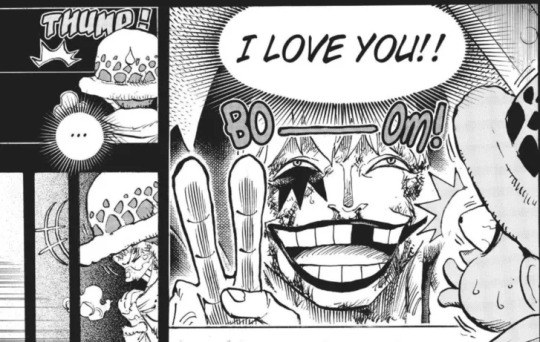
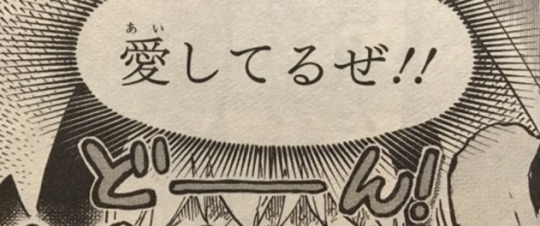
Corasan frees Law, then he dies at the hand of Doflamingo, Rosinante's own brother.
All Rosinante wanted was for this poor kid to go on and live his life unburdened by his more than turbulent history and his connection to Doffy, but I think for all his planning, Rosinante's one critical error was well and truly underestimating how much him loving Law, and loving Law to the extent he did, would mean to that kid. Law really went from that ten year old hollow void sentiment of "why does anyone or anything at all get to exist when everything that was important to me is dead, burned to ashes and wiped off the map" to "I should have died at age thirteen and every second I've lived since then, I've only lived as a result of Corasan's efforts and as a personal affront to Doflamingo." This time, Law has a tangible, heinous 10 foot monster of a target to direct 1. his grief and anger and 2. justice for Cora towards, and this time he has the power and will to follow through. More than that, he believes Corasan sacrificed himself for him because he's a D. (someone destined to rain down destruction on the gods - Doflamingo, in this case). Corazon becomes a saint that Law dedicates the rest of his life to. Which is something that Law is not vocal about to just anyone he comes across, but is so unbelievably obvious once you know what you're looking at — his tattoos, his jolly roger, his crew, his ship, his ambitions, his beliefs, his fucking. custom-made Corazon jacket. all of it for this man that showed Law - at a time when he hated the world and everything in it - love. For all of six months. max.
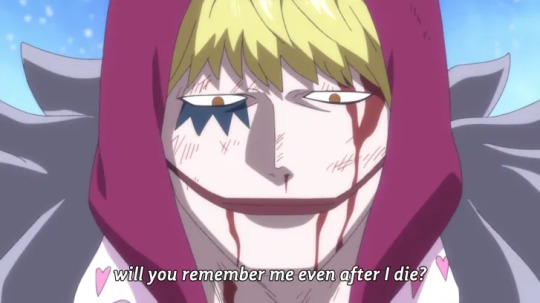
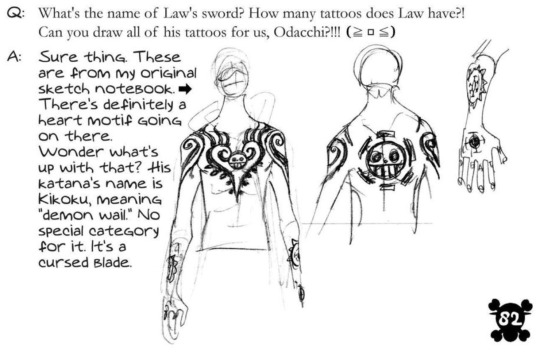
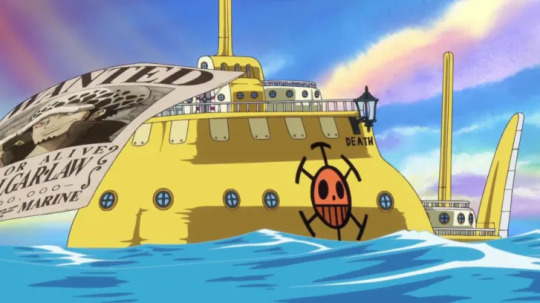
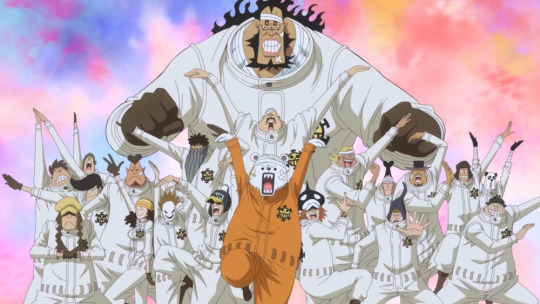
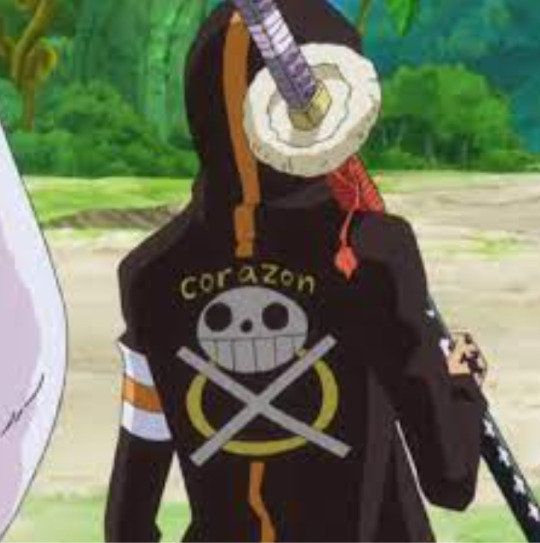
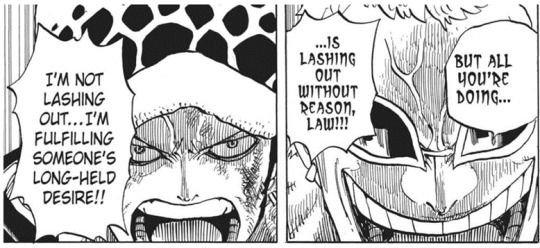

And his whole life and personality and behaviour CONTINUES to be guided by this trauma — the way he's reckless with himself, his borderline self-destructive actions, the way he keeps telling himself that none of it would've been worth it unless Corasan's last wishes are fulfilled, the way he surrounds himself with bright people and soft things, the way it doesn't register that his crew genuinely loves and cares about him, the way he's terrified of losing anyone important to him again (and I would say this is one of his biggest downfalls as a Captain compared to someone like Luffy - who is just as reckless as Law is but trusts his crew, doesn't try to send them away, isn't afraid to let them grow and risk their lives for him like Law is with the heart crew), his inability to take a damn compliment. The way he doesn't understand Luffy AT ALL.
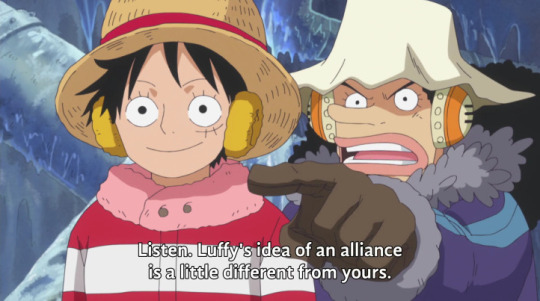
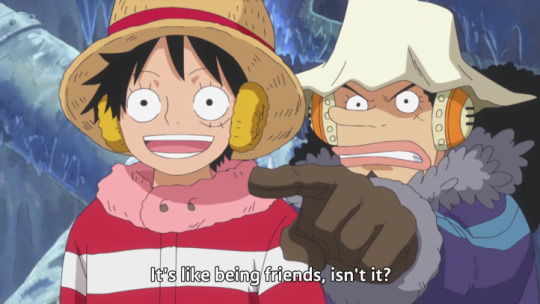
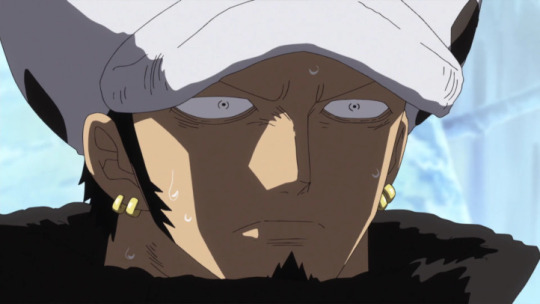
Doesn't understand that this alliance that he's brokered means nothing to Luffy because he sees him as FRIEND. No transactions or mutually beneficial pacts necessary. Doesn't get that he's the one that inadvertently asked Luffy to be his friend, thus breaking a long chain of people (mostly parental figures and siblings) abandoning or leaving Luffy behind/no one taking the first initiative to ask to be around him. Law is complete and utterly in the dark as to why someone would ever bat for him when the stakes are this high for no other reason than because they like them and care about them as a person.
Luffy, with his playground rules where he loves unconditionally and will take on the world for a friend he made five minutes ago, perplexes Law with his sheer simplicity.
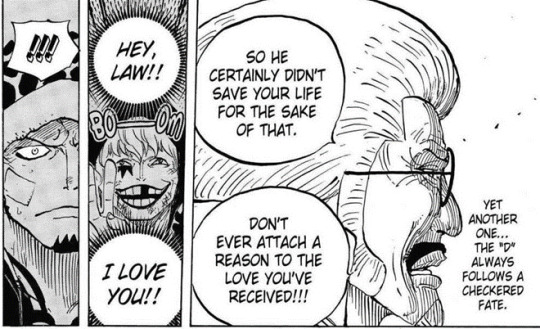
When Sengoku tells Law, "Don't try to find a reason for someone's love", I do NOT think he takes it well. Because there must be a reason. There has to be. Between the two options of Corasan saving Law's life and freeing him because he believed in the will of D., or Rosinante saving him for no other reason than because Law was a kid that was loveable, and because he loved him unconditionally... everything we've learned about how Law functions up until this point suggests the former will always make more sense to him, and after everything he's been through, is most likely less painful for him to accept.
#LONG POST#in this essay i will... oh no. this was a spiral i was not ready to go down.#I'm not doing okay btw#one piece meta#these were originally 2am tags but upon reflection i thought it should probably be its own post#CJ's op watch-through#one piece#op#trafalgar law#trafalgar d water law#corazon#corasan#donquixote rosinante#monkey d. luffy#lawlu#dressrosa spoilers#op meta#op analysis
383 notes
·
View notes
Text
The thing most commentators miss about the "Greek Myths aren't literal" line of argument, is that there's much more behind why modern western society (America in particular) loves to take greek myths (specifically involving messy sexual relationships) literally. America really loves a scandal doesn't it, and America really loves a celebrity scandal. When it's an act of sexual misconduct that is blown up, people like to think it's for justice, and sure, that is a legitimate part of why people focus on these things, but that's not the reason it blows up. The reason is that America loves a good juicy scandal. Ultimately, what the pop culture version of greek mythos and the greek gods tell an observer says much more about modern American culture than it does the ancients, and what I mean when I say "the myths weren't taken literally" is simply that one can know more about what the myths may tell us about the ancient civilizations, if one were willing to not ignore their cultural political and esp environmental contexts.
Myths weren't "just stories" (they are to us which, again, says infinitely more about us). They were stories inspired by an experience with some natural phenomenon near to where the myth telling culture dwelled. Just to give one example, the myths of Dionysus gifting wine to people often ended with accounts of madness and dismemberment. This likely corresponds to how shocking the effects were when the ancient societies first discovered wine. Similarly, the myths of gods sexing women and impregnating them likely referred to the idea of a communion with the divine that is so potent it can produce a physical product, and analyzing the role women play as the unique conduits of that in the ancient mythos is a far more feminist and productive way IMO to engage than just to dismiss these myths bcs rape. By this interpretation, a modern day retelling actually true to the spirit would not only contain a consensual relationship, but also explore our modern day notions of the divine, sex, sexually, and the idea of offspring (expanding it from children to, say, works of art or ideas for instance)
In conclusion, myths tell us more about the current culture perpetuating them, myths were stories within a specific context, and we would be throwing away a lot of potential for meaning making if we cannot acknowledge these facts. If there's one thing Lore Olympus got right in it's retelling, is that by setting things up 50 Shades of Gray styled, it tapped into the consumer psyche plain and simple: that's what the modern western audience want in a retelling- a scandal dressed in greek mythos. That's what we think these myths are.
#thats it thats my essay#Hellenic polytheism#polytheism#mythic literalism#helpol#tagging the try guys just bcs thats also what prompted this reflection#the try guys#lore olympus#tagamemnon#also id appreciate it if ppl who agree rbed since i think theres some interesting ideas in here and i want it to get around to ppl
2K notes
·
View notes
Text
Guys I'm studying Greek tragedy in my ancient studies course and I always knew Red Dwarf is tragic, but now I have the knowledge to see it actually fits Aristotle's requirements for tragedy perfectly with Lister being the central tragic figure.
First we have the hamartia. This is an error of judgement, a mistake that leads to tragic plot. Lister's moment of hamartia is smuggling Frankenstein onto the ship.
This leads to peripeteia, the reversal of circumstance. Lister refuses to give up Frankenstein and is put into stasis as a result.
When he comes out of stasis, we have the anagnorisis. The realisation. Everyone is dead, Dave.
Then by the end of the first episode at least, there is catharsis. He is not completely alone, and he has a hope that the slime is coming home.
We also feel both pity and fear during the story, which is what makes tragedy according to Aristotle.
#red dwarf#one of the assignments I have is reflecting on a piece of contemporary media in relation to greek tragedy#and as much as I think I could make it about red dwarf I think red dead redemption 2 has more bite to it so I'm doing it on that#but this shows the potential! someone else write the essay lol#fmj#fmj: text
58 notes
·
View notes
Text
I was deep in my drunk feelings when I made a joke post threatening to write about episode 5 symbolism and mizu, but then enough people said "where is the essay" so I am here to ramble as requested
in ep 5, the tale told in the puppet show spliced with the flashback sequence of mizu’s marriage identifies mizu as not only the ronin, but also the bride and, with tragedy, the onryō. I would argue that mizu is also depicted (in a less linear fashion) as the phoenix itself, and will circle back to this thought later
mizu is first presented as the ronin, the warrior with a singular purpose. as the ronin’s lord is assassinated by the rival clan, mizu’s mother is killed in the house fire. the ronin swears his revenge, and dedicates his life to this cause. through his childhood and into his young adult life when he departs from swordfather, mizu is exclusively the ronin. he is not the onryō yet, demonstrated in his honorable unwillingness to harm the men who stab him and throw him out of the shop even after he insists that he wasn't looking for a fight in the first place
the ronin is only able to rest and put away his mission when he meets the bride, the lover. however, mizu’s bride is not literally another person she meets. the bride is not mama, or mikio, but the lover mizu discovers in herself, the one allowed to bloom in place of mizu-as-ronin. mizu’s growth into the bride from the ronin occurs over time, but solidifies in the moment when kai is gifted to her by mikio, paralleling the taming of her own distrust and expectations of being hurt. (side note, giving a nod to effective use of color: the bride puppet, dressed in reds and oranges, has matching coloring to the gifting scene, as it takes place in autumn)
mizu’s transformation into the onryō happens in two parts, beginning with the slaying of the bride and completing with the slaying of the ronin. the betrayal by mikio and mama kills the softness in mizu, kills the lover she has allowed herself to become. mizu-as-onryō retaliates by killing the ronin: the part of himself that hesitates before striking, that part that cares for honor. in not intervening in mama’s death and then murdering mikio in turn, mizu kills the ronin in himself, slaughtering it in retribution for the dead bride
mizu is both the bride and the ronin, peaceful lover and noble warrior, until he is not—he is the onryō, only the onryō. episode 5 opens with the narrator saying, “no one man can defeat an army, but one creature can.” only as the onryō, and not as the ronin or the bride, does mizu have the force of will and capacity for violence it takes to singlehandedly overcome boss hamata’s thousand claw army and protect the brothel
mizu’s identity and place in the world is a constant dialogue. he is too white to have a respectable place in japanese society, but is also seen by abijah (our stand-in for white british society) as filthy and corrupted. he is not perceived as enough of a man to walk through life wholly as one (madame kaji’s comments about his apparent lack of sexual desires, his bones breaking “like a woman’s” under fowler’s hands, his disregard for honor and recognition as a samurai). she is also not enough of a woman to exist peacefully as one with mikio (she is a swordsman, an accomplished rider, bad at domesticity; “what woman doesn’t want a husband?” mama chastises)
the moment when mikio rejects her completely following their spar is a particularly poignant narrative beat about tolerance of “the other” in gender presentation: mikio can accept her as a woman only until she bests him at manhood, at the sword, at violence. she is Other in that she is physically strong, a poor cook, able to wield a sword. these traits are all tolerable to mikio, also an outcast, so long as she is not so Other as to be a man. but her swordsmanship bests his, and bests his in the way the sun outshines a candle. it is too Other, and therefore she is not a woman. she is a monster to him, the onryō, even before she kills the bride and the ronin in herself
(( as an aside, this series does a very good job at discussing the oft-challenging relationship between race and gender (e.g. that it is difficult for mizu to live as a biracial man, but would be deadly for her to live as a biracial woman), and demonstrating how queerness of identity complicates that relationship even further—but that’s a topic for a different post ))
as the narrative has been building on this idea that mizu is both the ronin and the bride, the man and the woman, japanese and white, episode 5 concludes with the heartbreaking reveal that, although mizu is all of these things simultaneously, he has had these identities beaten out of him by tragedy and cruelty and his own self-loathing hand
but mizu does not stagnate as the monster. we return to the metaphor of steel: too pure and it becomes brittle, breaking under pressure. mizu is a sword, a weapon that he has forged for the sole purpose of revenge and blood, but he has excised too much of himself to successfully deliver on his goals—he is not the ronin or the bride, he is the onryō; she is not a woman or a man, she is the onryō; the onryō is nothing but pain and vengeance—and so it breaks
“perhaps a demon cannot make steel,” mizu says. “I am a bad artist”
swordfather replies, “an artist gives all they have to the art, the whole. your strengths and deficiencies, your loves and shames. perhaps the people you collected… if you do not invite the whole, the demon takes two chairs, and your art will suffer”
to be reforged, mizu must not only acknowledge the impurities she has beaten out of her blade, out of herself, but lovingly, radically accept them and reincorporate them into the blade, into herself. he adds impure steel—the people he has collected, with their own dualities—to the sheared meteorite sword: the broken blade that fit so perfectly in taigen’s hand (the archetypal ronin, but a man seeking happiness over glory), the knife akemi tried to murder mizu with (the archetypal bride, but with ambition for greatness), the bell given to ringo and returned to mizu in broken trust (the man unable to hold a sword, but upholding samurai principles of honor and wisdom), the tongs that honed mizu’s smithcraft under swordfather’s guidance (the artisan, a blind man who sees more than most). to make of herself a blade strong enough to see her promises through, she must hold her monstrosity and honor and compassion and artistry in equal import
she is the onryō, and the ronin, and the bride, and all the people she has collected.
with this we finally come to mizu as the phoenix. mizu undergoes many cycles of death and rebirth, both in the main storyline and the flashbacks into her life leading up to the present. often, mizu is juxtaposed against literal flames—the burning of his childhood home, swordfather’s forge, the fire as he battles the giant in the infiltrated castle, the heart sutra forge of her own making, the climactic second confrontation with fowler. not every death/rebirth mizu undergoes is thematic to flame, of course. the fight with the four fangs, spliced with the rebirth ceremony of the town, for example, or the deaths of her ronin-self and bride-self, giving rise to the onryō
he is the phoenix, unable to truly die: every fatal combat he pulls back from the brink, reborn over and over in the wake of failure and setback. in episode 1, mizu prays for the gods to “let [him] die.” not to help him to face death unafraid, not to die with honor or victory, but to die at all. mizu has experienced death a thousand times over, but not once has it stuck
(( as a parting aside: the ronin’s rage at the phoenix clan for killing his lord parallels mizu’s self hatred of his mixed heritage (which he believes to be the thing that killed his mother), and so the ronin’s quest for revenge against the phoenix clan is mirrored in mizu’s quest to kill the white part of himself as best he can, by killing the white men who could be his father ))
mizu, the ronin. mizu, the bride. mizu, the onryō. mizu, the phoenix.
#blue eye samurai#mizu blue eye samurai#hopefully this is mostly coherent#I have more things to say but this was getting lengthy#there's also a lot of gender and racial nuance I've glossed over here for an attempt at brevity and structure#god also the COLOR. do you know how much I have to say about the use of color and shadow as a reflection of the narrative#maybe I'll write another damn essay who knows#this show really scratches the part of my brain that was academically trained in film analysis#blue speaks
152 notes
·
View notes
Text
oda was listening to the part of work song when hozier goes "when my time comes around / lay me gently in the cold dark earth / no grave to hold my body down / I'll crawl home to her" when he wrote the zs death pact actually. who else is doing it like them huh. who else has such devotion written into the very fibres of their beings, to not only their captain but each other and the rest of their crew.
#to me zs as the wings of the pirate king truly embody devotion#and this isnt me trying to downplay the devotion of the rest of the crew#not at all no no no i could write essays on them#but something about putting your body on the line#again and again and again#they're sides of the same coin and luffy is the sun reflecting off the polished metal idk#off topic but frobin is soooo hozier coded#one piece#vinsmoke sanji#black leg sanji#roronoa zoro#zosan#sanzo
102 notes
·
View notes
Note
Imagine if Jin Zixuan DID yeet his brother from another mother (🥲) down the stairs.
Meng Yao: I'm your brother. Happy birthday! 🥰
Jin Zixuan: There can only be one. YEET
I am truly sad he didn't; think of the 'No Doubles' memes that we could have had...

#ask#Convoluted edit...my apologies...but do you see my vision?#Original text is: 'jesus was kin with god and was executed because the roman emperor said no doubles.'#I sort of recall CQL/The Untamed having JZX kicking Meng Yao but I could be imagining it#My memory is bad. As I keep reminding everyone. Do not ask me to recall things. I have brain damage. And an attention disorder.#I'm a big fan of the theory of Jin Zixuan and Meng Yao being born same day AND year. Adds to the drama. Tragic not-really-twins#Also sitting here right now and realizing that their arcs go in the reverse direction of each other.#Parallels in the way your mirror image is the opposite reflection of you.#Every empty space one leaves is filled by the other. Every gain one makes the other diverts in the opposite direction.#Oh no I think its time to write another essay.
133 notes
·
View notes
Text
One of my favorite things about TTPD is definitely the thread of what makes an artistic genius a genius that runs through it. Specifically, the very concept of genius as it pertains to Taylor swift and how she herself has evolved that definition within her own field, how she mocks it and interrogates it on this album. But also the way it conflates with how we dub her a genius these days; artistically, strategically, philosophically (depending on your mileage). The crux of the issue ultimately is that historically, geniuses are often characterized as men who are lonely and flawed to the point of unsociable. It is in fact their genius that tortures them and isolates them and subsumes them and makes them flawed. And then in turn, the only men who can create great works of genius must also possess those traits because they are decided markers of genius, and so on and so forth. Women geniuses, the few that earn that moniker, in turn are often marked by caveats tacked onto any praise or recognition of their genius work. (It’s all non-cis-men “geniuses” really but for the sake of this discussion, we’re talking specifically about women v. Men because Taylor is a cis woman in a predominantly cis male controlled space) In Taylor’s case, it’s fearless deserved AOTY because it’s impressive….. for a teenage girl writing about teenage girl things, instead of simply saying the album itself being a great work of genius deserving of the award regardless of her age and it’s subject matter. Another being instead of simply saying she is skilled at distilling the human experience, she is deemed adept at distilling the girl experience, the girlhood of her weepy, exuberant little girl audiences. Always a qualifier, always a subset and an othering of female genius. It’s genius…. Within the confines of the handicap of being a woman.
If you trace back her relationship to this confine, at first, she did try to fit into this genius mold sculpted by men. Young and girlish as she was, she still peddled the idea that she too was churning out these genius songs from a sort of tortured and lonely isolation, albeit scribbled in gel pen ink with kicking feet and yearning sighs, but in isolation all the same. I say peddled not because she isn’t a fabulous solo songwriter but she wasn’t often in total isolation as per the (male) genius handbook, and there in lies the very thing her genius begins to push back on, and the genius presentation of women that often clashes with the defined genius mold of men. She’s incredibly social. Vivacious and thrives being around friends and family, and her line of work traffics in that vivaciousness as a pop star, smiling and dancing and giggling on stage for thousands. She enjoys collaboration and throwing parties and meeting new people professionally and personally. She seeks out interactions with her own fans, to varying degrees over the years but still her hand is always reaching out across the barricade. How much of this is purely a product of a public persona and how much is her innate personal qualities is a moot argument, because the fact remains the same that this is the persona we are presented with, who is the antithesis of the male genius. And it’s not to say that she isn’t lonely or flawed or tortured about it.
TTPD specifically interrogates that idea both through the lens of observing a guy who fancies himself a genius in that very male way, but also her own representation of genius in the world and how she repudiates the male genius mold foisted upon her. Mocking the stereotypical misanthropic traits of this male “genius” she encountered on songs like the title track, but also mocking the way he (and us by extension) try to classify her as a genius with all the trappings of one. Going as far as to refer to herself as an idiot in contrast, not intellectually perhaps but in terms of her comprehension of the world and her place in it, she doesn’t feel like a genius, not the way the man she’s speaking to seems to cartoonishly categorize them anyway. She doesn’t want to hole up in the Chelsea hotel with a typewriter wallowing in the burden of her genius because she doesn’t feel burdened by it that way, but rather her genius makes her curious and compelled to continue living boldly and blindly. If his (and the world’s) idea of genius is that willfully lonely tortured poet, then she’s much happier to cast herself as a modern idiot. She continues to push back as the album progresses, wherein she doesn’t claim she doesn’t get lonely or she isn’t flawed, but simply that she doesn’t define herself that way or even let those feelings steer her. Broken Heart is a quite literal example where she endures one of the biggest heartbreaks known to humankind and touts her ability to continue to perform her job due to the fortitude of her compartmentalization, not letting it decide how she will live her life. The Prophecy, where she bangs her fists against the forces that insist that she must remain in the lonely tortured poet mold in exchange for this genius, be they arcane or the small mindedness of modern world around her. She becomes animalistic, feral as she howls at the moon even, refusing to be shackled. Which brings us to Who’s Afraid, the most violent push back against the male genius you could say. She does not retreat to the folklore cabin in the woods as she once did when she is lonely and flawed and tortured, but instead lashes out and monstrously displays her emotion in the faces of those who scorned her, promises to never retreat and to instead haunt them, and perhaps all of us, forever. A Frankenstein’s monster of herself, where she is both doctor and creation. A story whose comparison is apt for its subject matter, but also in its creation that gets to the core of how she redefined genius.
Mary Shelley, a woman, wrote Frankenstein, a seminal work of literary genius, and while the book is about a genius tortured in isolation by his genius creations, she didn’t write it in lonely tortured isolation herself. She came up with it in a house full of friends where they played a game to see who could come up with the best ghost story, for fun. The impetus of its creation was to share it with others and emotionally connect with them. The manuscript closes out TTPD with a harrowing but frank recounting of a transformationally damaging relationship in her life where the song itself confronts how she hid the scope of the damage from others, and even to a degree herself, behind the genius works she created about that relationship. Ironically, some of which are the single works that had the big wigs and critics and greek chorus of the music world finally cement her genius. The lemonade out of lemons she could have said and been done with it. But it wasn’t the declaration of genius that those works afforded her that brought her closure and peace on the matter, as the Manuscript dictates. It was the way the work of artistic genius was received and emotionally resonated and connected with people that allowed her to emotionally connect to it herself over the years and create more art from it until she finally understood the experience fully. Understood what the agony of it all had been for back in her early twenties, and thereby understood what the genius is all for now. If being a woman is seen as a handicap by her genius peers or by those who decide genius in others, merely a hysterical woman or a weepy little girl, perhaps it also could be a huge reason for why she’s able to redefine it, due to her access and ability to embrace those hysterical weepy emotions as only women are allowed to do in modern society writ large.
And so Taylor reshapes the identifying image of our genius as a bitter, tortured, stoic man in his cabin into a smiling face of a woman overwhelmed by a thousand emotions, clasped hands reaching out over barricades. Or one of eyes searching and recognizing herself in the faces of 80,000 people in an audience. Even seeking artistic collaboration with her friends that often results in sharing ghost stories of their own kind out of a desire to connect with each other. As sad and heartbroken and lonely she may feel, she will never be alone and the great mistake of the tortured and isolated male genius is thinking that he must be. If you believe that there is some divine purpose that bestows artistic genius upon a person, what Taylor Swift discovered and redefines and insists upon is that it is not a lifelong curse of loneliness but a gift of boundless and eternal human connection.
#taylor swift#ttpd#noodled on this in the car for a while and banged it out this morning over coffee after being social for two days#and i'm about to go be social again and i'm like gotta dump my brain thoughts real quick before i'm off being dumb with my friends#anyway idk what this is i just love the concept of genius and how relative it is and how silly it is but especially artistic genius#read and watched and listened to stuff lately that had me thinking about this and how ttpd contrasts with the#confident and almost bullish persona we've seen lately from her in terms of her own self reflection#not in a bad way just like huh two sides of the same coin#my silly little essays
42 notes
·
View notes
Text
as true as the jokes about “everyone wants to rewrite ninjago” are i feel like smthn people forget when complaining about the inconsistencies of the show is that…. it wasn’t planned? it’s not like most other animated shows lately - it didn’t start with a deeply fleshed out world or a meticulously designed pitch bible with grandiose plans for a long-term story or character arcs. the ninja don’t originally get their powers from heredity because they weren’t hereditary powers yet. the magic system doesn’t make sense bc they literally just made it up as they went! they go back and forth on stuff like whether non-elementals can learn spinjitzu bc it’s a collaborative piece of media made by people with vastly different levels of control over the story, the animation, the sets, etc. that varied over the course of the series. it’s totally understandable and exciting to see so many people reworking the early stuff with the lore and logic later seasons introduced but i personally feel that… if you’re doing that. you need to understand why the show is like that instead of writing it off as being bad and shitty. it was working with what it had. it’s only what it is now because of that awkward troubleshooting phase, not in spite of it
#ninjago#text✨#you’re 100% allowed to criticize the show but i keep seeing people complain about the inconsistencies about like. their parents giving them#their powers especially. like yeah cool that wasn’t a thing yet? they have different origins than the non-core elementals#because in the real world that idea hadn’t even crossed their minds yet! the original story was a more traditional fantasy narrative of#normal people rising to the occasion and *gaining* powers through their own feats. the fact that they changed it later doesn’t mean#it was necessarily bad to begin with or that it’s something that should be mocked#idk just. there’s a lot of hostility in some circles about this stuff and it makes me kinda sad. enjoy the complexity of production and how#series adapt over time. it’s part of why the show is so interesting to me#that essay i wrote had a whole bit juxtaposing the attitudes about technology in rebooted and prime empire and how they reflect greater#cultural trends between 2013 and 2021. it’s SUPER interesting and yet a lot of people only talk about it to make fun of how ‘bad’ it was :(#this isnt to say i don’t enjoy some of the retcons. the changes to their meetings with wu in s8 are genuinely really interesting! i love the#changes to cole’s backstory. i think his mom makes him in the early seasons even better! i’m just saying.. be respectful? nobody *tries* to#make a bad show. ages and ages of time and dedication were put into what ends up on your screens. it’s all human love and creation.#as goofy as it is#okay sry got all anthropology there but hm. been thinking about this for a while. apologies for being the local annoying early seasons fan
830 notes
·
View notes
Text
To Live So Close To The Spotlight (The Zeppo)

I have, in essays past, referred to Xander Harris as one of the most controversial characters in Buffy the Vampire Slayer. After spending more time in the current fandom landscape, I need to correct that statement. He’s simply one of the most disliked characters in Buffy the Vampire Slayer. A lot of people hate him, and given his appearances up until now, it’s not entirely difficult to see why. Xander is an archetypical example of what I will call the Mild Nerd Guy; a trope born out of the 1980s and its Revenge Of The Nerds-led championing of geek culture. A trope that unfortunately came to dominate genre television throughout the 1990s and 2000s.
This is a character who is defined in opposition to more typical Dashing Action Hero archetypes. Where the Action Hero is strong and muscle-bound, the Mild Nerd Guy is physically weedy. He is often shy and lacking in self-confidence. He will appear creepy when he means to be charming – but in an innocent way that encourages us to feel sympathy with this helplessly befuddled young man. He has interests coded as “nerdy” – comic books, science, maths, Dungeons and Dragons. He will be unsuccessful with women, and more often than not will concentrate all his sexual energy onto a single desired target: a popular and attractive woman. This woman will - at least at the beginning of the story – neglects his silent pining in favour of clearly undeserving Bad Boys and Popular Jocks. This is where you get is your Scott Pilgrims, your Ross Gellers, your Tom Hansens, your Every Character Anthony Michael Hall Ever Played… and yes, your Xander Harrises.
In essence, the Mild Nerd Guy is an alternate model of masculinity, one that certain types of men (shy, nerdy, physically weak) may relate to more than the Dashing Action Hero archetype. Unfortunately, while the trope often presents these men as more respectful towards women than their counterparts, the reality is that female autonomy is a secondary concern in both cases. These are competing models that men can use to Earn Women. Neither is actually concerned with the desires and goals of the women involved at all.
The Mild Nerd Guy has obvious parallels to the sociological concept of the Nice Guy, a term that most in feminist circles should be comfortably au fait with by now. The Nice Guy feels deserving of the attentions of women solely because of his lack of overt hostility towards them, and resents them when this “niceness” is not immediately rewarded with sexual favours. While the two concepts should not be conflated – one is a writing trope while the other is a social phenomenon – they are inextricably linked. Media informs the way we interact with the world, and the world informs the way we interact with media. Male entitlement engorges itself with stories of men winning women through inaction - the implication being that men deserve the attentions of women by default, and should be upset when it is not automatically bestowed upon them.
Meanwhile, women who have firsthand experience of this entitlement and the behaviour it encourages will naturally be fed up with it, and will bring that frustration into their consumption of media. They will take one look at a Scott Pilgrim or Xander Harris and be immediately, justifiably repulsed. While the more fantastical crimes of Angel or Spike can be easily forgiven, everyday crimes cannot. Most women have never met a serial killer. We’ve all met a creepy nerd.
This is not a criticism of viewers who have reacted in that way. The common accusation of Xander being a “Nice Guy” I believe an inaccurate read on his character and a misuse of a term meant for the analysis of reality and not fiction. However, I can’t blame anyone who makes that instinctive leap. In fact I would say that bringing one’s own experiences to the consumption of media is the only correct way to watch television. And yet, I can’t count myself truly among that crowd. Despite my distaste for the simpering entitlement this trope has encouraged in male nerd circles, and despite the times I have been disgusted by a line Nicholas Brendon has been made to deliver thus far, I can’t say that I don’t like Xander. In fact, I would say I like Xander, and this episode is a big reason why.
Read More
197 notes
·
View notes